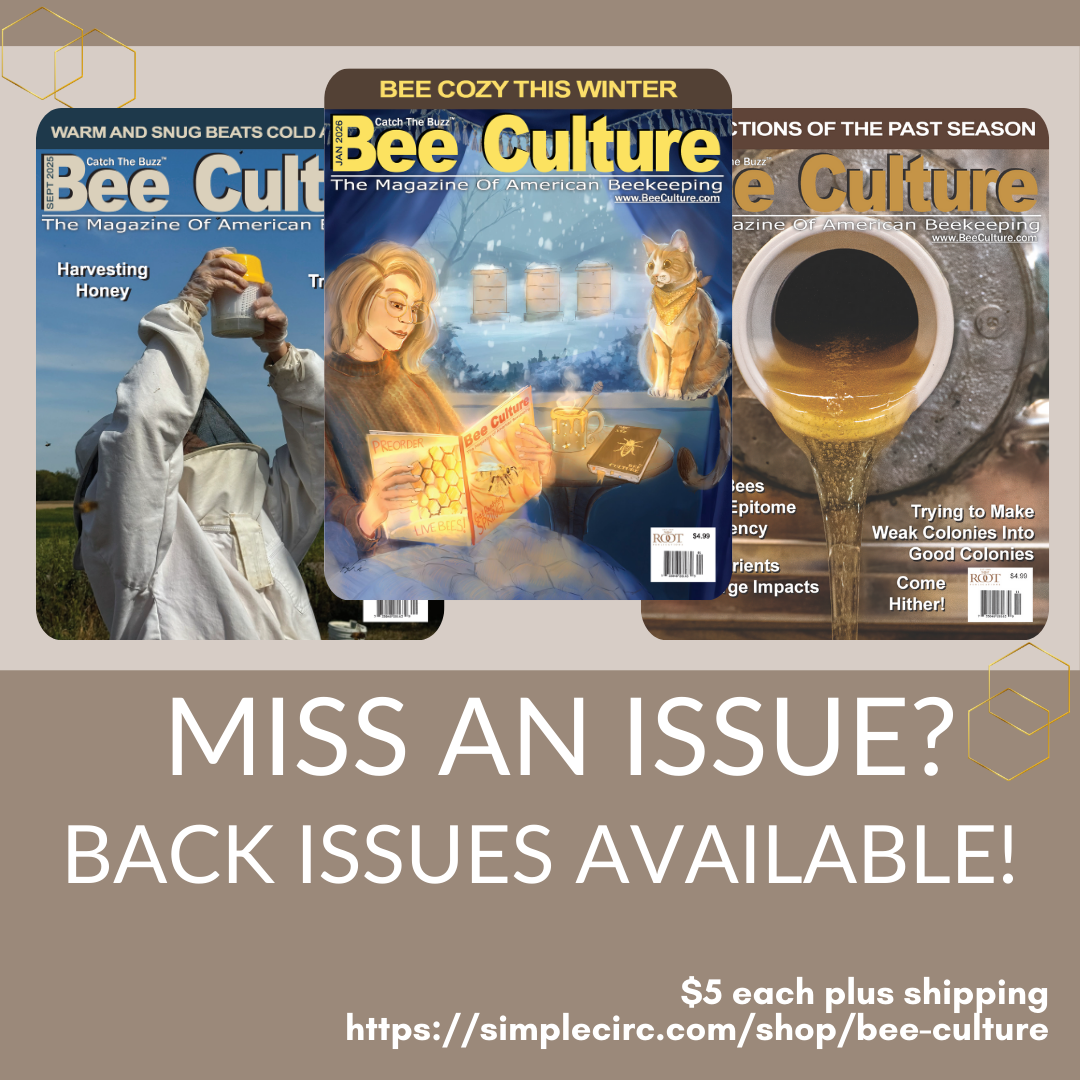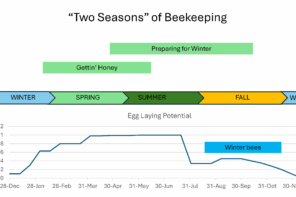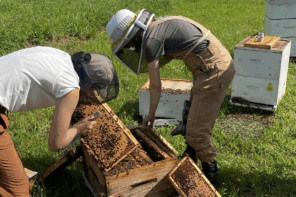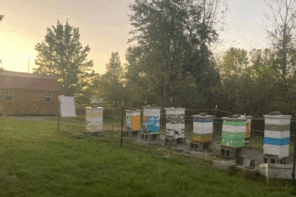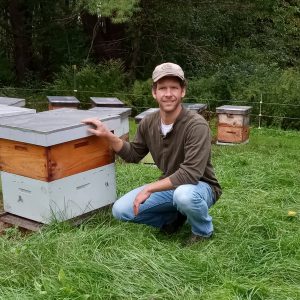 of Hall Apiaries
of Hall Apiaries
By: Jeff Kennedy
We are living in an unprecedented time. A time of immediate gratification, where almost anything you could possibly want to know or own is just a Google search or click away. We are saturated with negative media coverage and overstimulation is the new norm. The beekeeping industry is no exception. The multitude of social media platforms that vie for our attention have spawned a plethora of self-proclaimed “experts” spewing information to uninformed newbies. Although there are outliers in every group, the bulk of these “experts” are in it for the recognition and limited fame that comes with being a content creator on YouTube. Call me old fashioned, but I prefer to take advice from the real, salt of the earth beekeepers that actually do this for a living, and have at times risked EVERYTHING to get to where they are at today.
When Bee Culture’s editor, Jerry, asked if I would be interested in reaching out to a fellow beekeeper to interview for this month’s issue, there was one such beekeeper that immediately came to mind. This wasn’t because he is a close, personal friend of mine. To be totally transparent, prior to this interview, he and I hadn’t conversed since I purchased queens from him back in 2019. I chose him because he is modest, wise beyond his years and how he has conducted himself during times of prosperity and near total devastation, could serve as an example for all of us. Since a lot of the specifics of honey bee genetics, husbandry practices and equipment are covered time and time again, I focused more on the often-overlooked business side of beekeeping.
Troy Hall is the owner/operator of Hall Apiaries located in the Upper Valley Region of New Hampshire and Vermont. Troy has been a commercial beekeeper since 2010 and during this time, he has been predominantly treatment free. Troy warns that his approach to beekeeping has been anything but easy, with lots of hard work and little pay. This rang especially true during the first couple of years as he was developing a treatment free program for his apiary. Troy honed his craft studying under famed Vermont beekeeper Kirk Webster, whom first introduced me to Troy’s work. He currently runs multiple apiaries throughout his region with specific yards for honey production (300 colonies), nucleus colonies (350) and mating nucs (388). Troy was gracious enough to take time out of his busy schedule and sit down with the readers of Bee Culture to discuss the trials and tribulations of operating a small scale, treatment free, commercial operation.
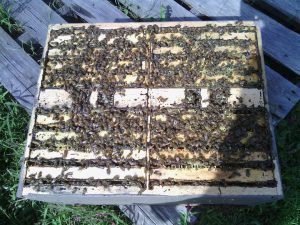 JK: I find myself on the cusp of transitioning from a sideline to a small-scale commercial operation and have several questions related to the business side for folks such as yourself that are making a living from their bees. I know that you took the leap almost from the start when you were just 18 years old so perhaps you had less risks involved at that time of your life. I’m curious to know what some of the challenges were that you first encountered on the business end (cash flow, equipment, infrastructure, etc.)? How did you get your business plan moving forward (conventional bank loans, USDA micro loans, etc.)?
JK: I find myself on the cusp of transitioning from a sideline to a small-scale commercial operation and have several questions related to the business side for folks such as yourself that are making a living from their bees. I know that you took the leap almost from the start when you were just 18 years old so perhaps you had less risks involved at that time of your life. I’m curious to know what some of the challenges were that you first encountered on the business end (cash flow, equipment, infrastructure, etc.)? How did you get your business plan moving forward (conventional bank loans, USDA micro loans, etc.)?
TH: Early on, my biggest challenge was cash flow. I had very little cash in my business account, just enough to cover month to month expenses at times. I was hesitant to take out a loan not knowing what the potential of my apiary was. I needed to prove to myself and let my business prove to me that it was viable and could stand on its own. Being in my early 20s at the time I had a very small budget at home, I didn’t need much and my overall debt was low. To get the whole thing moving forward I needed to produce a honey crop and sell a surplus of queens to generate revenue to reinvest back into my business for next season. Once my business was established, I took out a USDA micro loan to help cover the expense for a honey house and workshop.
JK: What is the most important piece of equipment in your operation that you wished you would/could have purchased earlier?
TH: My truck. I started with a half ton and moved up to my current truck, a ¾ ton (2016 Ford F250) with a flat bed. It is my opinion that in order for it to be a good bee truck, a flatbed is essential. There was always the itch for a better extractor or a bigger facility early on but I had to make do with what I could afford. I feel some people can get into trouble early on in their business venture with bees by not being disciplined enough to really weigh needs and wants.
JK: Your business model reflects a combination of nucleus colony, mated queen and honey sales. Now twelve years into it, is this still a viable business model? Are there aspects that you hope to scale up/back in the coming years as the enterprise grows?
TH: It is. This model (nucs, queens and honey) has been the productive engine that has enabled me to have revenue in tough years and in the good years I was able to reach up and grab onto the next level above me in my business plan. I am reaching a level now where it’s been really fun and it’s amazing to look around at all I have and accomplished completely from my bees paying for it all. Going forward, the demand for honey, queens and local overwintered nucs is very high so I am always trying to increase production and keep the workload manageable for me while still doing most of the work with the help of a few other helpers.
JK: If you could offer up just one little pearl of wisdom to a sideline beekeeper that’s considering taking the leap into full-time employment with their bees, what would it be?
TH: Stay above reproach in all your business endeavors. Be honest and reputable, stand behind what you produce and sell, there is room for everyone at the table. Keep your love and passion for bees the focus as your business grows. It’s the heart of what keeps me going. Tell yourself, “I do not know all the answers.”
JK: I have heard you say in another interview that you don’t make a lot of money. You have even said that you aren’t worthy of an $80,000 a year salary. Can you explain what you mean by this and in your opinion, what perks does a lesser paying career in beekeeping offer that the suit in the high rise, netting six figures annually misses out on?
TH: Being that I started from nothing and grew what I have today from the sole merits of my bees, I have a hard time with people starting a bee business expecting to make a lot of money. I am not saying you can’t, there is plenty of opportunity for people to make a good living and life style around being a beekeeper. My point being, it’s the mindset of becoming a farmer. This is lost on our culture today. Most people feel they need to make $80,000 or six figures to live a comfortable life. That is not true. You can do very well and live happily with less. Some of the perks for me are, I am my own boss, working alongside the honey bee and immersed in nature, working with my hands, and mind.
JK: In your experience, what have been some of the toughest challenges in operating a sustainable apiary in a cold, northern climate? Have you seen that certain genetic lines perform better in a colder climate than others?
TH: Winter mortality has been the toughest challenge. Things have changed over the last few seasons. There is a greater pressure on the bees from mites and the environment. The genetics that survive and thrive here are the Carniolan and Russian strains.
JK: Do you have any specific advice for that third year beekeeper who wants to start dabbling into producing their own queens and working towards a sustainable apiary?
TH: Master the art of raising good queen cells; this is dependent on following a scheme with setting up and managing your cell builders from one year to the next. Some years, the bees raise cells with very little effort, other years it feels like I must coax along or stimulate them due to the environmental impact on the bees from one season to the next.
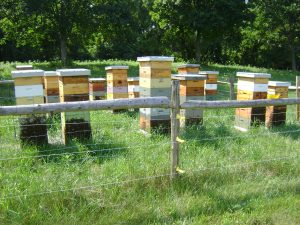 JK: Being a predominantly treatment free beekeeper, I have heard you say that you can’t be treatment free without rearing your own queens. Can you expand on this a bit?
JK: Being a predominantly treatment free beekeeper, I have heard you say that you can’t be treatment free without rearing your own queens. Can you expand on this a bit?
TH: It’s not entirely, but it often feels like a numbers game. You need to spread the risk over a large population. To do this, I need to raise my own queens from my own tested stock that is surviving and thriving in my apiary from one season to the next. I need to raise as many daughters as I can and get them installed in nucs to overwinter. Nucs typically don’t struggle with high mite pressure due to the brood break upon making them up and the timing of our seasons when the queens shut down for Winter. Having an ample supply of nucs in the Spring allows you to replace your losses with your own bees. If I had to buy bees every year, I would be out of business.
JK: Treatment free is a romantic concept with a devote following. We all have our own beliefs/disbeliefs on this method and its effectiveness, so this interview isn’t the time or place to unpack all of that. Can you define for me what treatment free means to Troy Hall and his operation?
TH: To manage an apiary without the use of chemical treatments for varroa and other ailments. In all honesty, it is becoming very hard to maintain a treatment free paradigm over the last two seasons. As I mentioned before, I feel there has been a change in the mite/virus complex plus the environmental stressors playing out on the bees.
JK: I have heard you say in the past that when you decided to commit to being treatment free, you knew the risks that were involved and were prepared to lose everything and possibly have to start over. Prior to the Spring of 2021, you experienced colony losses that were in line or just a tad higher than the national average annually, however; coming into 2021, you had some concern about the health of your colonies that were coming out of Winter. Will you share with us what you think happened and how you responded?
TH: I lost just about all my apiary in the Spring of 2021. The Fall of 2020 was a very dry one here. So, nutritionally the bees were stressed to the max. Being nutritionally stressed funnels all the mites onto a smaller population of bees when the queens reduce the overall number of eggs laid. This was the perfect storm for failure. (I was feeding pollen sub and syrup all along when things got tough). It was too late as the problem was already baked in by September when I started seeing crashing colonies throughout my apiary. This was the first time I had ever witnessed this type of event, for I had experienced bees being nutritionally stressed in the previous season of drought. Overall, I feel it was mites/virus and drought that killed off my bees.
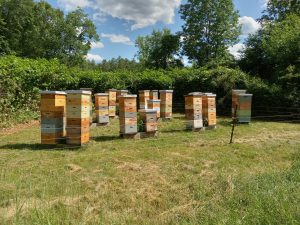 JK: What are our biggest challenges in beekeeping today and where are we headed?
JK: What are our biggest challenges in beekeeping today and where are we headed?
TH: We need mite resistant bees. We need more beekeepers (queen breeders) all over the country and world on the frontier of breeding for these bees. Beekeepers using their wit and creative abilities to solve these problems. We need to band together to keep our industry going.
JK: Troy, I appreciate your willingness to be interviewed today and additionally, want to commend you for being the person that you are. You have built a sound operation that offers quality queens and great honey, but more important to me than this, is that you are morally and ethically sound. The level of transparency that you have shared with our audience today will help countless readers such as myself whom are toeing the edge of that sideline/commercial line. We’ve already went deep into the weeds for this article so let’s end with some rapid fire, fun stuff!
JK: Favorite hobby outside of beekeeping?
TH: Music/playing guitar.
JK: Favorite movie?
TH: As Good as It Gets
JK: Favorite non-beekeeping book?
TH: The Pilgrim’s Regress by C.S Lewis.
JK: What famous deceased person would you most want to meet?
TH: Theodore Roosevelt.
JK: If you weren’t a beekeeper, what would you be doing for a living?
TH: Running a saw mill.






